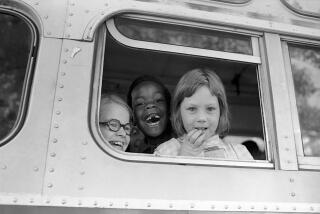Racism: the Nation’s Oldest New Problem
- Share via
When President Clinton called for an end to racism, I was reminded of a play performed by students when my children were in elementary school.
In the “Scottish” play, Macbeth was African American, Lady Macbeth, Chinese. The other cast members were from all over the world. It was a tribute to Shakespeare, to the school and to what Los Angeles could be.
After the last curtain call, I watched my children playing with their friends. They looked like a picture on a UNICEF Christmas card. Some of their families had lived here for generations. Others had come more recently, with memories of midnight border crossings, of refugee camps, of fathers shooting off their own thumbs to avoid fighting in a war against the people who are now their neighbors.
When my children were in junior high, I noticed that they stopped seeing some of their old friends. Their new ones were all from the same racial group.
I saw the same thing happening almost everywhere I looked. Groups of children were usually mixed, but the vast majority of teenagers, cheering at their school’s basketball games or shopping in malls or standing in line for movies, had grouped themselves according to their race.
Certainly, interests change as we grow older, and we begin to notice that some people look different, like different foods, have different priorities. We begin to feel more connected to those who seem familiar to us. “Familiar” shares the same root as “family,” after all.
We learn to look for the cues: physical characteristics like skin color and facial features; cultural ones such as language, religion, political beliefs, even degree of assimilation, which explains the tension between recent arrivals here and descendants of emigrants from the same country.
Although sometimes it seems that there is a cosmic law that separates us as arbitrarily as it gives us life, in the end these differences are only symbols, shortcuts to recognizing our extended family. As we compete for territory and its rewards--safety and wealth--we hunker down, defending and defended by our own kind against whichever group poses the most immediate threat.
Good intentions and dialogue will not change our nature, nor will stricter enforcement of civil rights laws, for fairness cannot be legislated. Increasing the ability of those who have less so that they may compete with those who have more is not enough, if it means that those who have more feel threatened.
Any group that feels its territory is under attack will find a way to get around laws, or worse, use violence, to safeguard it. We need an improved economy to ensure that one group’s gain is not at the expense of another.
When that happens, it’s in Los Angeles, one of the busiest racial intersections in the world, that the president’s call can be realized. Our children have grown up together. They have played on the same soccer teams. They have gone to one another’s birthday parties.
But for now, teenagers continue to discard childhood friends like last year’s fashions. They sacrifice diversity for the familiar and empathy for safety, and racism, the nation’s oldest problem, is renewed once more.
That’s a real tragedy.
More to Read
Sign up for Essential California
The most important California stories and recommendations in your inbox every morning.
You may occasionally receive promotional content from the Los Angeles Times.













